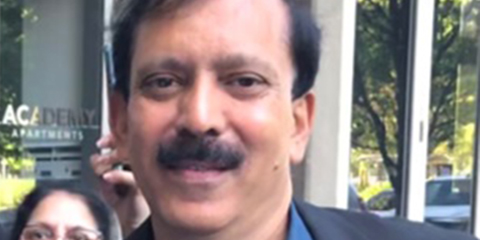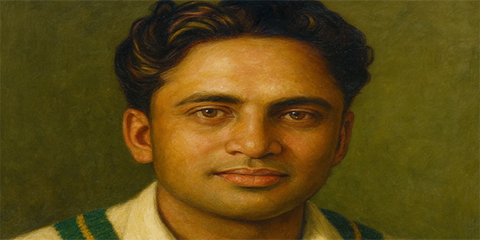Why Shahid Hashmi is cricket journalism's gold standard for professional excellence
JournalismPakistan.com | Published 3 months ago | Dr. Nauman Niaz (TI)
Join our WhatsApp channel
ISLAMABAD — In cricket, as in words, some pursue the limelight with clamour, and others move with a quieter assurance, bearing with them a truth neither purchasable nor perishable. Among the latter stands Shahid Akhtar Hashmi (famously Shahid Hashmi), a man who has consecrated his life to accuracy, to honesty, and to the cadence of language aligned faithfully with the game. He is not just a journalist, but a witness, his voice carried across continents, his name spoken with respect in press boxes from the West Indies to the subcontinent, reserved for men of incorruptible principle.
A Heritage of Letters and Faith: The Making of a Cricket Journalist
He is heir to a family of letters and of faith. His father, Baqar Ali Hashmi, though a banker by profession, possessed the gift of language, shaping scripts for documentaries and films with the discipline of craft. His maternal uncle, Dr Allama Tahir Surti, was a scholar of renown, venerated in the Arab world for his lucid translation of the Holy Quran into accessible Arabic and for volumes on Islam that entered countless households. Respected across the Arab world, he translated the Holy Quran into lucid Arabic and enriched Islamic literature with numerous works, among them Piyaray Nabi ki Piyari Zuban (The Dear Prophet's Sweet Language), an Urdu primer for learners, suffused with love and clarity.
From such a heritage of letters and faith, Shahid Akhtar Hashmi shaped his own intellectual path. He secured his BSc in Industrial Engineering with distinction, taking second position in his class. Yet his calling lay not in the rigours of machinery, but in the music of words.
From Engineering Excellence to Journalism Mastery: The Career Journey
In 1992, he stepped into journalism, and since 1996 has served with steadfast devotion at Agence France-Presse (AFP), the world's oldest and most influential news agency. His voice has narrated the drama of eight Cricket World Cups, beginning in 2003, carrying the game's fortunes to readers across continents.
In 2005, he joined ARY News Television, where his long and faithful association endures; he now presides as Sports In-Charge, consequently shaping coverage with a steady hand. To his credit lie stories of momentous weight: among them, the tragic passing of Bob Woolmer in the West Indies in 2007, and the storm of match-fixing controversies that shook the cricketing world. He co-authored, with the late Khalid H. Khan, a volume on the 1996 World Cup, adding to cricket's literary literature.
Global Recognition: A Voice Heard Across Continents
Hashmi's writings have traversed borders as easily as his words. He has written for The Guardian (UK), contributed to the BBC English website, and to the Mumbai Mirror of India. Between 1993 and 2016, he stood as a correspondent for the BBC World Service, and even now lends his insights to their broadcasts at intervals. His voice has also reached audiences of SBS Radio, Australia, and the sporting screens of India.
What distinguishes him, however, is not just the breadth of his portfolio but the fibre of his being. Accuracy and honesty are the touchstones of his craft. He has remained untouched by scandal, valuing truth, humanity, and the dignity of others above all else. In an age when clamour too often drowns sincerity, Shahid Akhtar Hashmi's voice carries the rare note of trustworthiness.
The Foundation of Excellence: Engineering Precision Meets Journalistic Integrity
In Shahid's boyhood home, words were never just adornments; they were vessels of truth, carriers of meaning. From this lineage, he inherited a reverence for plain-spoken honesty, for language as a moral act.
His own journey began not in newsrooms but in the austere corridors of engineering. At NED University, amid equations and machines, his mind was honed to precision, and he graduated with a BSc in Industrial Engineering, second in his class. Yet though steel and numbers trained his intellect, it was words and sport that stirred his soul. In 1992, he turned to journalism, not in rebellion against his degree, but as the opening of another parallel career. He began humbly, writing for cricket magazines; by 1996, his byline had joined the venerable Agence France-Presse (AFP), the world's oldest and one of its most influential news agencies.
Breaking Major Stories: The Bob Woolmer Tragedy and Match-Fixing Scandals
From there, his dispatches travelled across continents, across tournaments, and across eight ICC World Cups from 2003 onwards.
He became not just a raconteur but a custodian, guardian of cricket's great splendours and its darker betrayals. It was Shahid Hashmi who first broke to the world the harrowing news of Bob Woolmer's death in Jamaica during the ICC World Cup, 2007, and who pursued with undaunted clarity the sordid tales of match-fixing that disfigured the game. His prose, dispassionate yet humane, eschewed sensation; it sought instead the plain truth, and in that pursuit, he found respect. In 2005, he joined ARY News Television, where he would rise to Sports In-Charge and their Sports Editor. Even there, amid the noise of broadcast journalism, his presence conferred seriousness and depth; under his hand, the coverage carried both the weight of fact and the living pulse of the game.
A Career Built on Principle: The Hallmarks of Professional Excellence
Shahid Akhtar Hashmi remains a figure of rare distinction: one whose career has been less about acclaim than about fidelity, less about prominence than about principle. In an age that too often confuses noise for substance, his voice has been a reminder that truth, plainly spoken, is its own enduring light.
He was never confined to one masthead. The Guardian, the BBC English website, and Mumbai Mirror in India all carried his words. For the BBC World Service, he became a familiar voice from 1993 until 2016, and even now returns to them, lending his experience at intervals. Australia's SBS Radio bore his reports; Indian channels too drew from his craft. His reach has been as wide as the game itself, yet his fidelity has always been to the values with which he began.
Untouched by Scandal: A Testament to Integrity in Sports Journalism
In Shahid, there is no trace of the scandal that too often shadows those who walk close to the world's great games. He has never been party to controversy, never bartered truth for favour. Instead, he has chosen to walk a straighter, lonelier path: one of humanity, care, and a rigorous honesty that is at once his shield and his legacy. He values humanity above headlines, evidence above speculation, care above calculation.
The career highlights speak with the simplicity of milestones along a long road: the cricket magazine in 1992, AFP from 1996 to this day, ARY News from 2005, and more than two decades at the BBC World Service. Yet behind each date and each role lies a man who has carried forward the old virtues—accuracy, clarity, dedication.
The Philosophy of Cricket Journalism: Reflecting Life Through Sport
John Arlott once said that cricket at its best is not only a game but a reflection of life itself: patient, honest, revealing of character. Shahid Hashmi, in his writing and in his presence, has embodied that same belief. He is a reminder that journalism, like cricket, is about more than the score; it is about fidelity to the truth of the thing, spoken plainly and without fear. He has stood across decades as one of the game's honest chroniclers, his words as enduring as the echo of leather on willow, and as uncompromising as the line of a good length ball that refuses to be driven from its course.
The Self-Made Professional: From Engineering Student to World-Renowned Journalist
There are men whose lives follow the charted lines of maps long drawn for them, roads laid by ancestry, avenues of patronage, destinations that beckon with certainty. And there are those who, like solitary travellers, set a quiet foot upon the unmade path and go on with only resolve for luggage, integrity for compass, and an inner truth for the guiding star. Shahid Hashmi belongs to that latter company.
He began among draughting tables and engine rooms, where numbers behave and steel submits: NED University, the click of slide-rules, the stern music of mathematics. Engineering schooled him in the inevitability of cause and effect; it taught him that every line must carry its load and every structure its proof. While classmates took their degrees into offices and factories, he shouldered another weight. Life, with its unarguable bills and its private reckonings, demanded that he earn even as he learned. So journalism came, not as romance but as livelihood, night work for day study, a paragraph here, a match report there, bread as much as byline. What began as a provision became a profession; what was a necessity turned, almost shyly, into a vocation.
The Engineering of Excellence: How Technical Training Shaped His Journalism
He is, in the literal sense, self-made. No ancestral key turned for him; no convenient hand on the shoulder opened doors. He stood on his own two feet and made those doors himself. From margin to main text, the boy who scribbled between lectures became the man whose words were awaited. The engineer never quite left him. You can hear it in the building of his sentences: no untidy speculation, no loose bolt of assertion; everything squared, plumb, load-bearing. Yet the finish is not cold metal but grain and warmth. His reports carry feeling—not sentiment, but the felt knowledge of responsibility, of the lives and livelihoods that cricket touches beyond its fence.
The Quiet Authority of Truth: Professional Standards in Modern Sports Media
His honesty is a clear stream, not a flood. He does not mistake volume for courage. He speaks when he has weighed, and when he speaks, the words fall with the quiet weight of conviction. There is neither malice nor theatre in his candour. He tells the truth as it is because the thing as it is matters. In an age when expedience cross-winds the craft, he has held his course; where others trim, he stands square to the breeze. He can be courteous as a host and, in the same breath, immovable as a boundary post. Confront him, and you will meet the unvarnished truth, never brandished to wound, always offered to reveal.
First Encounters: A Karachi Meeting That Defined Professional Friendship
I met him in Karachi when Australia came in 1994–95. The city was tuning itself like an orchestra: klaxons, call to prayer, street-hawkers, sea-wind; inside it, the beat of cricket, quickened by the names of Shane Warne and the Waughs, Mark and Steven, Wasim Akram and Inzamam Ul Haq. The press box had its own weather. Some faces wore a polished politeness; some had the dry indifference of old campaigners. Shahid was there at once, hand out, eyes steady, welcome unlearned and unperformed. In a room where smiles often covered rivalries, his greeting was simply human. It began a companionship founded not on convenience but on respect.
The Craftsman's Approach: Building Stories with Precision and Care
Across years and continents, the impression did not change. He asked before he answered, listened before he wrote. In briefings, he took the back row, the better to hear; in copy, he took the front rank, the better to be precise. He did not elbow his way into the story. He held the coat while the story walked past, and you noticed, afterwards, that the coat was brushed and the seams sound. He filed for the record rather than the splash. Brick upon brick, a craft took shape; soon the temporary scaffolding of necessity was gone, and the structure stood of itself.
Integrity as Second Nature: The Moral Foundation of Professional Excellence
Integrity, in him, is not posture but breath. He will not colour fact to suit favour, will not dim truth to spare discomfort. This fidelity has made him respected and, on occasion, quietly feared. Pretence stumbles in his presence. He can be pragmatic; he knows how the world works, but his pragmatism clears the way for truth rather than detouring around it. He does not confuse compromise with principle, nor stubbornness with strength. His firmness wears the clothes of civility; his civility is basted with firmness.
Understanding Cricket's Deeper Rhythms: The Long View of Sports Journalism
The game he covers has its own long patience. A match is not a headline but a season of moments: sessions won and lost, tides turning on the wind of an hour. Shahid's reporting moves with that rhythm. He does not hurry the truth; he allows it to ripen. He knows that cricket, like character, shows itself over time. The single glorious stroke tells less than the stubborn hour; the one hot over less than the spell unchanged. He is drawn to endurance, to the men who bat by the ticking of their nerve or bowl by the grit of their will. His copy bears the same temper: not spectacular, but exact; not clamorous, but certain.
The Quiet Professional: How Modest Authority Commands Respect
There is in him a modest authority. He does not push to the front of the photograph; he steadies the frame. Players talk to him because they recognise the fairness in his manner and the accuracy in his memory. Colleagues trust him because he shares the work and keeps the faith. Editors lean on him because his pages arrive clean, essential, and on time. None of this is trumpeted; it is simply what he does. He wears his vocation like a well-used coat: serviceable, weather-proof, unshowy—and, in the storm, invaluable.
Professional Resilience: Navigating the Challenges of Sports Journalism
He has not been spared the small abrasions of the trade: the briefing where access is a prize, the tour where fatigue shadows the day, the match when rumour runs like a brushfire across the outfield. In those hours, his habits hold. He listens, checks, asks again, and waits. He will not be hustled by the speed of the moment, nor baited by the lure of the dramatic line. He would rather arrive second and right than first and wrong. It is a simple creed, and rarer than it ought to be.
The Music of Craftsmanship: Finding Beauty in Professional Excellence
If there is music in him, and there is, it is the quiet music of craft done properly. If there is steel and there is, it is the tempered steel that bends without breaking and holds its edge without flashing it. To sit beside him at a match is to feel the weather of cricket change in small, observant increments: the way a bowler's wrist loosens, the grip adjusts, a captain's field slides one place to the sun; the small data that make the large truth. He notices, he notes; he wills the essential into the sentence and leaves the rest where it belongs, on the cutting-room floor.
The Durable Virtues: Mastering the Fundamentals of Professional Success
The measure of a professional is not only in the bright hours when everything works; it is in the long, unlit stretches when diligence must be its own reward. Shahid's steadiness holds there as well. The late bus back to the hotel, the early call, the copy desk's query that asks for the same point in a different shape—he meets them with the same evenness. He has mastered the durable virtues: punctuality, accuracy, fairness, memory. They are unfashionable, and they last.
From Necessity to Calling: The Evolution of a Professional Life
What remains, when the bustle falls away, is the man. He began with the dynamics of beams and the strength of materials; he found his calling in the flex and give of words. He did not drift; he adapted. He did not complain; he worked. Out of necessity came livelihood; out of livelihood, calling. The doors he went through, he had made himself, and he did not look back to see whether anyone was applauding.
A Legacy of Clarity: The Enduring Impact of Principled Journalism
To speak of legacy, if we must, is to speak of tone rather than tally. He has shown that one may be courteous without being pliant, principled without being rigid; that accuracy is a form of respect, for the game, the reader, and oneself. He reminds us that journalism, like cricket, is judged in the long form: the quiet session, the ball on a length, the honesty that does not tire. In an era of amplification, he has chosen clarity; amid the confetti of opinion, he has kept to evidence. His manner has the human scale; his work, the moral one.
Remembering Excellence: The Lasting Impression of Professional Integrity
When I recall that first Karachi season, I remember the heat shimmering above the concrete stands, the practiced swing of a tea vendor's kettle, and the murmur that becomes a roar as a catch hangs and is held. But more than any single over or scorecard, I recall the simple decency of a handshake in a crowded room and the calm diligence that followed it through the years. Shahid Hashmi, a self-made, precise, and unafraid individual, has given his calling a good name.
And if, at the end of a long day, the lights go down and the ground drains to silence, there is still, somewhere in the editor's inbox, a page of clear sentences that tell what happened as it was. That is the measure of the man: gentleness yoked to candour, firmness clothed in courtesy, truth set down without fuss. Not noise, but poise; not compromise, but conviction. It is a way to live as well as to write, and he has kept to it, quietly, steadily, like a good line just outside off, asking the question until the answer comes.
Shahid Hashmi: honest, hard-working, and world-renowned. A man of repute, but more than that, a man of integrity. In his voice, cricket has found a witness who has never betrayed it. In his silence, a dignity. And in his work, a legacy that will last beyond the noise of any one match, carrying the truth of the game to those who care to listen.
Dr. Nauman Niaz is a civil award winner (Tamagha-i-Imtiaz) in Sports Broadcasting & Journalism, and is the sports editor at JournalismPakistan.com. He is a regular cricket correspondent, having covered 54 tours and three ICC World Cups, and having written over 3500 articles. He has authored 15 books and is the official historian of Pakistan Cricket (Fluctuating Fortunes IV Volumes - 2005). His signature show, Game On Hai, has been the highest in ratings and acclaim.

























